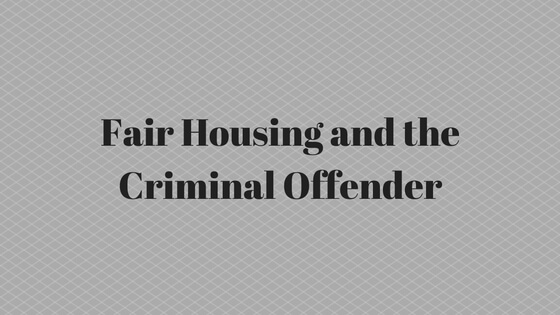On April 4, 2016, the U.S. Department of Housing and Urban Development (“HUD”) issued a Memorandum relating to the use of criminal records in the selection of tenants. While this Memorandum technically only relates to housing providers with HUD financed mortgages, the logic employed in this Memorandum has far reaching implications for all housing providers. Specifically, HUD has determined that the use of an applicant’s criminal history as a basis to deny an application for housing may constitute illegal discrimination based on race. This article will explore both the basis for this determination, as well as its legal and practical effects on property owners and managers.
Discrimination in housing based on race often arises in two distinct ways. The first type of discrimination is overt discrimination, that is, direct refusal to rent to a person based on their being a member of a protected class. A classic example, which frankly is rare, if not unheard of in our industry, would be a rental agent telling a Hispanic male that they don’t rent to Hispanics. This kind of direct, “in your face” discrimination is clearly illegal and, frankly, intolerable in our society. The second form of discrimination is so-called “disparate impact” discrimination. This form of illegal discrimination arises when an otherwise neutral policy or practice has an unintended discriminatory effect on a protected class. This form of discrimination does not require an intent to discriminate. Rather, it is the unintended consequence of a facially neutral policy that may be deemed discriminatory. If a policy is shown to have a disparate impact on a particular protected class, such policy may be deemed to violate the Fair Housing Act if it is not necessary to serve a substantial, legitimate, and non-discriminatory interest of the housing provider. The question raised by HUD was whether policies disqualifying applicants with criminal histories had a disparate impact on minorities based on their statistical rate of incarceration.
HUD’s analysis, in its basic form, is founded upon the following logic. First of all, HUD reviewed the statistical data showing that, while African American males comprised only 12% of the US population, they were 36% of the total US prison population. Similarly, Hispanics made up 17% of the US population but were 22% of the US prison population. Across all age groups, African American males were six (6) times more likely than White males to be imprisoned, while Hispanic males were twice as likely to be incarcerated. Based on the foregoing, HUD suggested that a policy excluding persons convicted of a crime could have a disparate impact on a person based on their race. While HUD did suggest that an owner could use local statistics to support such a policy and that all cases must be considered on a case-by-case basis, the Memorandum suggests that a policy could be deemed to have such a disparate impact based on this statistical data.
HUD then considered whether such a policy excluding persons convicted of a crime, even if it had a disparate impact, was necessary to achieve a substantial, legitimate, and nondiscriminatory interest. While the memorandum does recognize a housing provider’s strong interest in protecting its residents from criminal activity, the Memorandum suggests that there must be some actual basis for the assertion that a person that has been convicted of a crime is more likely to threaten the safety of the residents. There must be some actual basis to support such an assertion, rather than a general allegation. For example, HUD specifically finds that use of arrest data, rather than convictions, does not provide a reasonable basis upon which to assert that a person is dangerous or likely to commit a criminal offense, and therefore may not be used in the tenant selection process. In relation to use of criminal convictions, HUD suggests that a blanket prohibition on all persons with a criminal record would not be supported. Such a blanket policy, which does not look at the actual offense or when the conviction occurred, could result in rejection of persons for minor offenses which were unrelated to safety. As such, such policies would not be permitted. Rather, housing providers must develop policies which reject applicants based on criminal convictions which indicate a demonstrable risk to resident and property safety and security. These policies must consider factors such as the nature and seriousness of the crime, as well as how much time has passed since the conviction. The determination must also be made on a case-by-case basis. However, policies which exclude applicants without consideration of the foregoing elements are likely to be deemed illegal discrimination. In fact, even though the Fair Housing Act specifically does not provide protections to persons involved in the manufacturing or distribution of controlled substances, a policy for rejecting such applicants still must be tailored to avoid rejecting those who do not come within this narrow exception.
While many may assert that the logical and statistical bases underlying HUD’s opinion are flawed and that its position supports the old adage “liars can figure and figures can lie”, property managers and owners should take this opportunity to review their Tenant Selection Plans to ensure that they comply with the criteria established by HUD and would be defensible should a fair housing complaint be filed by an applicant with a criminal record. For example, any rejection criteria which is based on criminal arrests should be removed. Likewise, a blanket rejection standard for ANY criminal conviction should likely be modified to incorporate other objective criteria such as the seriousness of the crime, the date of the crime, and whether the conviction was for an offense which arguably could threaten the safety of residents. For example, a conviction for a non-violent crime such as forgery would likely not support a rejection. Similarly, a conviction for income tax evasion fifteen years ago would likely not be defensible where a conviction in the past year could. Managers should also consider incorporating an appeal procedure for all applicants to be afforded an opportunity to submit additional information or mitigating factors to be considered in response to a rejection. The bottom line…while a criminal history is still is permissible basis for rejection of an applicant, tenant selection plans must demonstrate due consideration to ensure that such policies, in fact, protect the residents and legitimate interests of the property. Blanket rejections of persons with criminal histories, without additional considerations, may lead to unwanted contact from your local fair housing agency or HUD!
This article is intended as a basic review of this HUD Memorandum. Please feel free to contact this office if you would like specific information as to the applicability of this new opinion to your specific property or to review your current Tenant Selection Plan.

